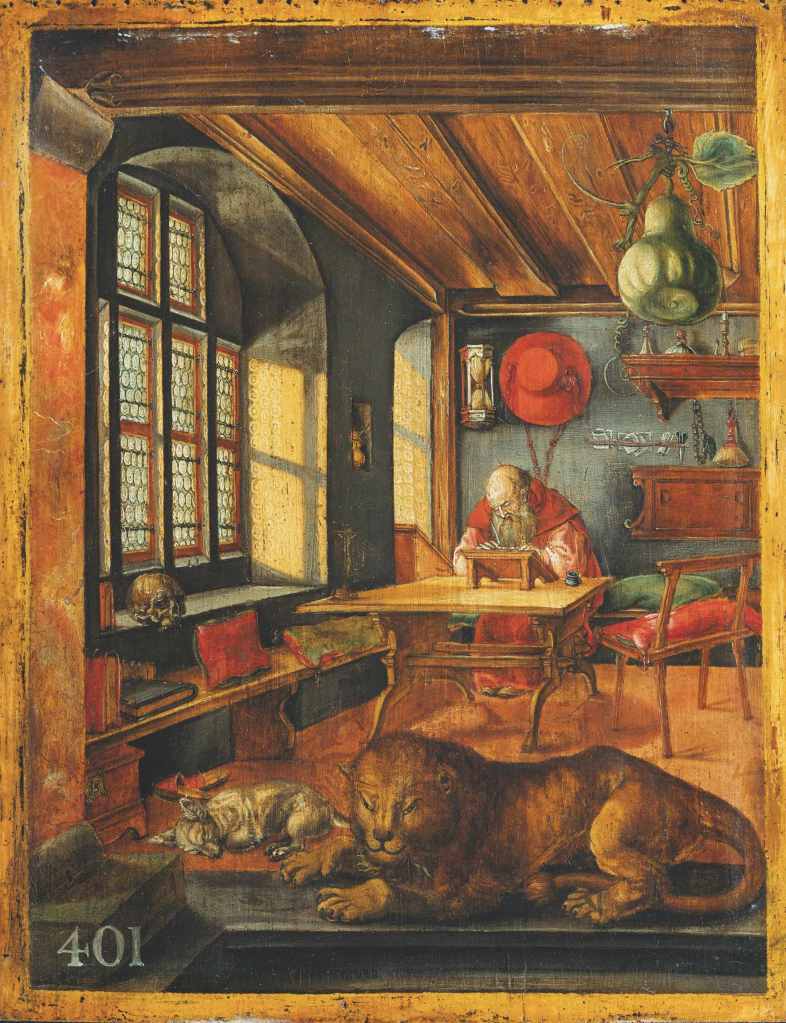I’ve never met John Barton. But reading his books on the Bible I keep thinking of him as an early church father, perhaps St Jerome. Barton has the obligatory beard, he’s an ordained minister in the Church of England, and his writing is sage and measured, scholarly but accessible.
Jerome was of course the translator of the Bible into Latin. In the fourth century his Latin Vulgate caused a riot in Tripoli, then part of the Roman empire, because Jonah was portrayed sheltering in the shade of a fast-growing ivy rather than under a gourd, as in the traditional rendering. (This accounts for the ugly spherical fruit dangling from the rafters, like one of those constant memories you’d rather forget, in Albrecht Dürer’s famous depiction of the saint in his study.) As Barton says, never underestimate the power of biblical translation.

T.S. Eliot called the NEB ‘vulgar’ and ‘trivial’, and thought it presaged the lasting decline of the English language
The Word is the follow-up to Barton’s bestselling, prizewinning A History of the Bible (2019). Most of us, lacking the necessary Hebrew or first-century Greek, read the Old and New Testaments in translation. What then are the challenges of vocabulary and syntax, of style, rhythm and genre that the Bible’s translators face? The Bible exists today in some 700 languages. It still has a long way to go if one considers that there are around 7,000 living languages extant in the world. Progress can be slow. The first complete Russian Bible to achieve any success didn’t appear until the 18th century; a Chinese Bible emerged only in the early 19th.
In the 21st century, English remains the dominant language of biblical translation. New translations appear every year to jostle the backlog of old ones. Understandably, Barton has chosen to focus on translations in his native language, and a heavenly host of acronyms – the RSV (Revised Standard Version), NEB (New English Bible), the GNB (Good News Bible), and on and on – crowd his pages.
The KJV, the 1611 King James Bible, petitioned for by the Puritan party in the Church of England, introduces another level of complexity. Its aim, as the preface announced, was to open the window and ‘let in the light’. It wasn’t in fact a wholly fresh version of scripture, being heavily dependent on earlier Reformation Bibles: the glorious plain-speaking of Tyndale (who argued that the syntax of the Hebrew Bible agreed ‘a thousand times more’ with English than with Latin), as well as Coverdale’s translation and others, including the Geneva Bible of 1560 (Shakespeare’s Bible) and the Bishops’ Bible of 1580. However, similar to the way Martin Luther’s translation is the Bible for most Germans, the King James remains the Bible for British and North American Protestants. It still looms large because of the way it’s embedded in our culture and our speech, although, as C.S. Lewis once showed, by the time it appeared its language was already archaic, so that it added a patina of venerability to the Bible, making it almost a weathered monument.
At one end of the long translating spectrum is the King James. At the other is the kind of semi-paraphrase produced in the 1990s by Eugene Petersen, in The Message. (A sample of Petersen’s Genesis i reads: ‘Earth was a soup of nothingness’.) In the ungainly technical jargon, the former is an example of ‘formal equivalence’, the latter of ‘functional equivalence’; or, to use Schleiermacher’s classic formulation of 1813, the first takes the reader to the text, the second brings the text to the reader.
Both approaches present intractable problems. Just because a translation of the Bible is more literal doesn’t make it necessarily more accurate. Equally, the commendable desire to transfer the Bible to a modern idiom can produce jarring consequences. Who can stomach ‘a low murmuring sound’, in the New English Bible’s story of Elijah, as a replacement for the ‘still small voice’ of the King James? And modern translations date rapidly, as J.B. Phillips’s unhappy rendering, from the 1950s, of Paul’s ‘holy kiss’ in Romans xvi as ‘a hearty handshake all round’, shows.
We’ve obviously come a long way in the 60 years since T.S. Eliot’s hysterical over-reaction to the publication of the New English Bible. Eliot called the NEB ‘vulgar’ and ‘trivial’, and thought its appearance presaged the lasting decline of the English language. Barton demonstrates his overall sympathy for modernising translations as a means of confirming that the Bible is still relevant. But he is also alert to the intricacies of the new set of challenges this creates for the translator. Questions of gender inclusiveness are just one of these – though God, whatever the Bible says, has no gender. So too is the need to reflect the fact that the Bible is a book made up of many voices, not simply a uniform text. John’s Gospel should therefore be rendered in a more stately style than the Synoptics; Paul’s letters in colloquial English; the Prophets in a broken, breathless style, representing their urgency and fear.
There can be no one, ideal version of the Bible, Barton concludes. There is no Holy Grail for translators to discover. Only a single source text with an infinite variety of possible versions, in an ever-increasing number of languages.






Comments